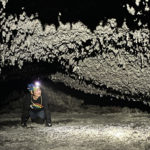A four-year, $1.29-million grant from the National Science Foundation has been awarded to University of Hawaiʻi at Mānoa researchers from the School of Life Sciences to study subterranean biodiversity associated with lava tubes in Hawaiʻi. The grant was awarded to Assistant Professor Rebecca Chong and Associate Professor Megan Porter, and collaborator Professor Annette Engel at the University of Tennessee-Knoxville.
The lava tube species on Hawaiʻi Island are found nowhere else in the world. Ecological threats facing lava tubes are similar to threats facing native forests and other Hawaiian ecosystems, including urbanization, climate change, biodiversity loss, and the spread of invasive species and pathogens, such as Rapid ʻŌhiʻa Death.On Hawaiʻi Island, continuous volcanic activities over hundreds of thousands of years created subterranean habitats, known as lava tubes, that are of different geologic ages. The lava tubes are occupied by communities of cave-adapted arthropod species, such as planthoppers, millipedes and spiders, which are sustained by the roots of the native ʻōhiʻa tree. Recent exploration of lava tubes on Hawaiʻi Island by the team and their collaborators has uncovered species that are new to science and new distributions for species underground in different lava flows across the island.
The project also has outreach goals that include educating both the next generation of diverse scientists and the public about integrative biological research, including collaborative training for students and researchers, year-long cross-disciplinary research internships for undergraduate students, and public outreach programs for the local community with researchers at the Bernice Pauahi Bishop Museum.
Photo credit: University of Hawaiʻi
